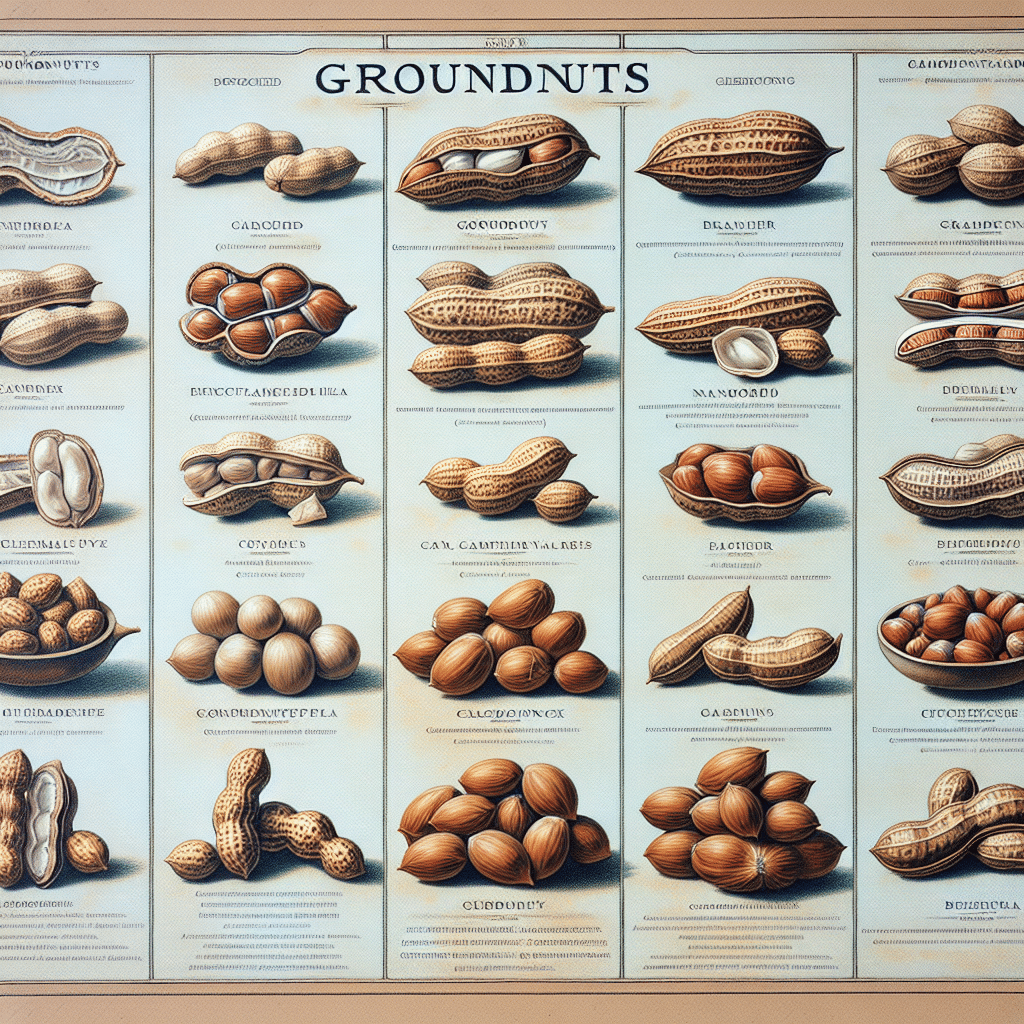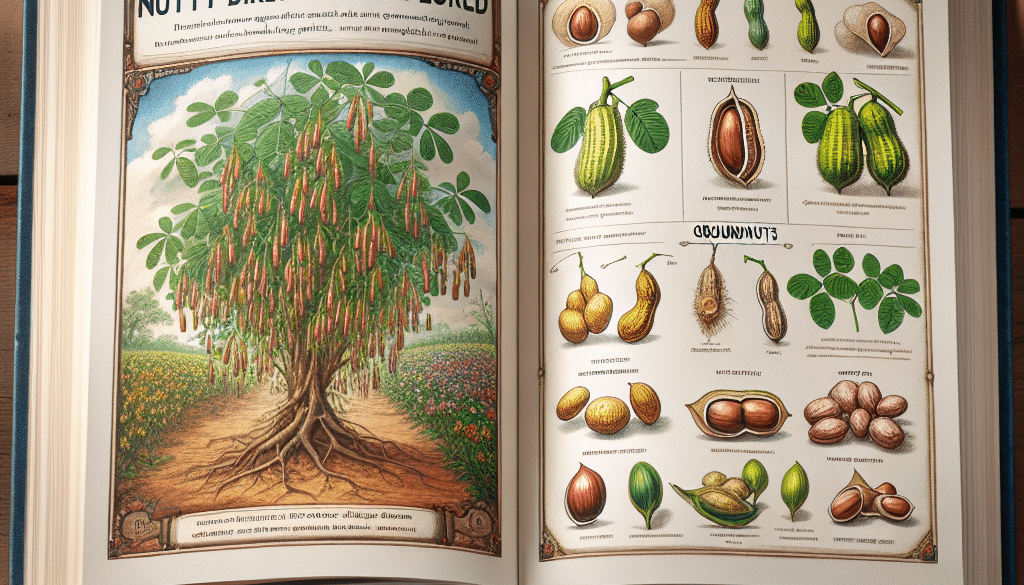List of Groundnuts: Nutty Directory Explored
-
Table of Contents
- Groundnut Varieties: A Comprehensive Nutty Directory
- Understanding Groundnuts
- Major Types of Groundnuts
- Popular Groundnut Varieties
- Groundnut Cultivation and Harvesting
- Nutritional Benefits of Groundnuts
- Groundnuts in Cuisine
- Groundnut Allergies and Safety
- Conclusion: The Nutty Directory’s Key Takeaways
- Discover ETprotein’s High-Quality Protein Products
Groundnut Varieties: A Comprehensive Nutty Directory

Groundnuts, commonly known as peanuts, are a staple in diets around the world, cherished for their rich flavor and impressive nutritional profile. They are not only a source of protein but also contain healthy fats, vitamins, and minerals. This nutty directory will explore the various types of groundnuts, their characteristics, and their uses, providing a valuable resource for both consumers and producers.
Understanding Groundnuts
Before diving into the list of groundnut varieties, it’s important to understand what groundnuts are. Despite their name, groundnuts are not true nuts but legumes that grow underground. They are the edible seeds of the plant Arachis hypogaea and are encased in a thin, papery shell.
Major Types of Groundnuts
Groundnuts can be categorized into four main types based on their seed size, shape, and pod characteristics. These are Runner, Virginia, Spanish, and Valencia. Each type has its unique properties and preferred uses.
- Runner Groundnuts: Known for their uniform size and shape, Runners are commonly used in peanut butter production due to their rich flavor.
- Virginia Groundnuts: Larger in size, these are often sold as snack peanuts and are popular for roasting.
- Spanish Groundnuts: Smaller with a higher oil content, Spanish groundnuts are typically used for peanut oil and snacks.
- Valencia Groundnuts: Characterized by three or more kernels per shell, Valencias are sweet and usually roasted or sold as “boiled peanuts.”
Popular Groundnut Varieties
Within the main types of groundnuts, there are several popular varieties that are cultivated and enjoyed worldwide. Here’s a closer look at some of these varieties:
- Georgia Runner: Dominant in the U.S. peanut market, this variety is prized for its consistent quality and flavor.
- Jumbo Virginia: As the name suggests, these peanuts are large and often used for gourmet snacks.
- Texas Spanish: A variety known for its high oil content, making it ideal for peanut oil production.
- Red Valencia: These peanuts have a distinctive red skin and are favored for their sweet taste.
Groundnut Cultivation and Harvesting
Groundnuts thrive in warm climates with well-drained soil. They require a growing season of about four to five months and are typically planted after the last frost in spring. Harvesting occurs when the leaves turn yellow and the inner shells develop a darkened color, indicating maturity.
Nutritional Benefits of Groundnuts
Groundnuts are not only versatile and delicious but also packed with health benefits. They are an excellent source of protein, essential for muscle growth and repair. Additionally, they contain heart-healthy monounsaturated and polyunsaturated fats, which can help lower cholesterol levels. Groundnuts are also rich in vitamins and minerals such as Vitamin E, magnesium, and potassium.
Groundnuts in Cuisine
Across the globe, groundnuts are used in a variety of culinary applications. They can be roasted, boiled, or fried and are often incorporated into dishes for added flavor and texture. Groundnut oil is also a popular cooking medium in many cultures.
Groundnut Allergies and Safety
While groundnuts are nutritious, it’s important to note that they are a common allergen. Individuals with peanut allergies must avoid groundnuts and their derivatives to prevent allergic reactions.
Conclusion: The Nutty Directory’s Key Takeaways
This nutty directory has explored the diverse world of groundnuts, highlighting the major types and popular varieties, as well as their uses and nutritional benefits. Groundnuts play a significant role in global agriculture and cuisine, offering a combination of taste and health advantages.
Discover ETprotein’s High-Quality Protein Products
If you’re looking for premium protein sources to complement your diet, consider ETprotein’s range of organic bulk vegan protein and plant proteins. Their products, including Organic rice protein, clear rice protein, pea protein, clear pea protein, pumpkin seed protein, sunflower seed protein, mung bean protein, and peanut protein, are non-GMO and allergen-free, making them suitable for a wide array of applications.
About ETprotein:
ETprotein, a reputable protein Chinese factory manufacturer and supplier, is renowned for producing, stocking, exporting, and delivering the highest quality organic bulk vegan protein and plant proteins. They include Organic rice protein, clear rice protein, pea protein, clear pea protein, pumpkin seed protein, sunflower seed protein, mung bean protein, peanut protein etc. Their offerings, characterized by a neutral taste, non-GMO, allergen-free attributes, cater to a diverse range of industries. They serve nutraceutical, pharmaceutical, cosmeceutical, veterinary, as well as food and beverage finished product distributors, traders, and manufacturers across Europe, USA, Canada, Australia, Thailand, Japan, Korea, Brazil, and Chile, among others.
ETprotein specialization includes exporting and delivering tailor-made protein powder and finished nutritional supplements. Their extensive product range covers sectors like Food and Beverage, Sports Nutrition, Weight Management, Dietary Supplements, Health and Wellness Products, and Infant Formula, ensuring comprehensive solutions to meet all your protein needs.
As a trusted company by leading global food and beverage brands and Fortune 500 companies, ETprotein reinforces China’s reputation in the global arena. For more information or to sample their products, please contact them and email sales(at)ETprotein.com today.












